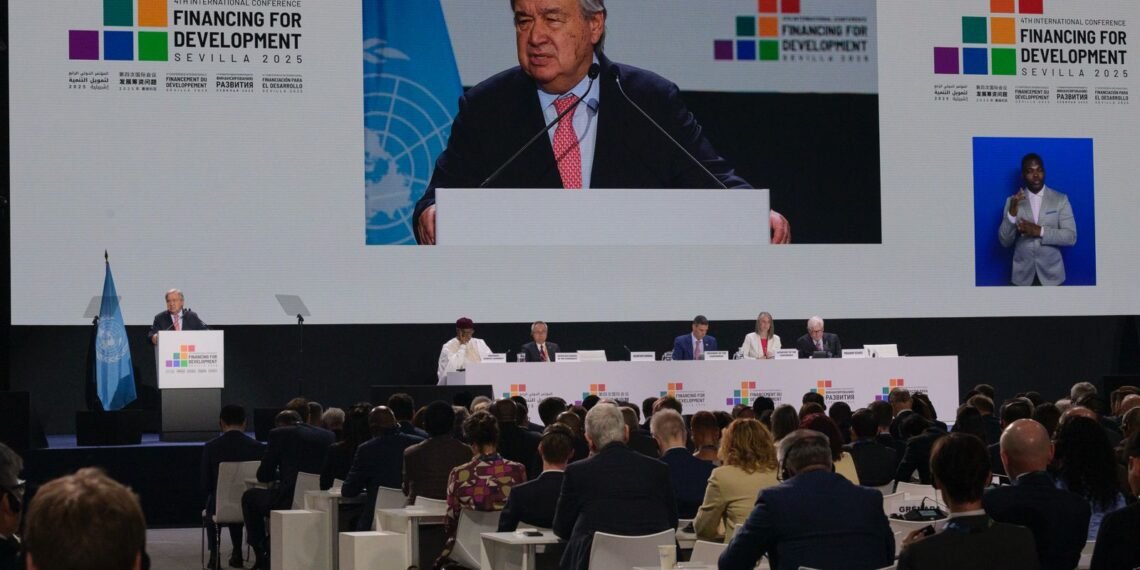UN Secretary-General António Guterres has issued a warning to world leaders, declaring that global development is facing “massive headwinds” amid deepening inequality, climate disruption, and geopolitical conflict.
Speaking at the 4th Financing for Development Conference (FFD4) in Sevilla, Spain, Guterres called for sweeping reforms and renewed global cooperation to salvage the Sustainable Development Goals (SDGs).
Addressing more than 50 heads of state and 15,000 delegates from over 150 nations, Guterres said, “Financing is the engine of development and right now, this engine is sputtering.” He warned that multilateralism is under pressure, with trust between nations and institutions eroding rapidly.
“As we meet, the 2030 Agenda for Sustainable Development – our global promise to transform our world for a better, fairer future – is in danger,” he declared. UN data shows that nearly two-thirds of the targets set under the SDGs in 2015 are off-track, with a staggering $4 trillion needed annually to realign global efforts.
“We are here in Sevilla to change course,” Guterres continued, urging global actors to “repair and rev up the engine of development” with the scale and urgency the crisis demands.
The conference culminated in the adoption of the Sevilla Commitment — a pledge to accelerate support for low-income countries and steer the SDG agenda back on track. However, the United States pulled out of the negotiation process earlier in the month, casting a shadow over the consensus.

Sevilla Pledges Action, Not Promises
Guterres outlined three urgent action points. First, he emphasized the need to mobilize domestic resources and for wealthier nations to fulfill their pledge to double aid contributions. He called for a tripling of Multilateral Development Banks’ lending capacity and the creation of innovative financial instruments to unlock private capital.
Second, Guterres criticized the global debt system, calling it “unsustainable, unfair and unaffordable.” He noted that poorer nations are spending around $1.4 trillion annually just on interest payments. To address this, he announced the formation of a new borrowers’ forum aimed at fairer debt resolution and practical action.
Third, he called for comprehensive reform of the international financial system to ensure that it empowers “every country, not just a privileged few.” He insisted on the need for “a fairer global tax system shaped by all.” Guterres was adamant that the conference should not be viewed through a lens of aid or handouts.
“This conference is not about charity. It’s about restoring justice and to facilitate the ability of all people to live in dignity. This conference is not about money – it’s about investments in the future we wish to build together.”
Spain’s King Felipe, speaking ahead of the official opening, told delegates that Sevilla welcomed the world “with open arms.” He underscored the urgency of producing a roadmap that is “concrete and tangible and actionable.”
President Pedro Sánchez echoed this sentiment, declaring, “Our time is now and our place is here.” Sánchez called on the international community to choose “ambition over paralysis, solidarity over indifference and courage over convenience.” He reminded delegates that the world was watching, and that the stakes could not be higher.
As the summit concluded, participants left with a renewed sense of purpose but also the daunting realization of the work ahead. The Sevilla Commitment may be a turning point—but only if matched with action and sustained political will.
READ ALSO: Ghanaian Banks Cut Bad Debt to GH¢654.2 Million in Early 2025 as Asset Quality Improves




















